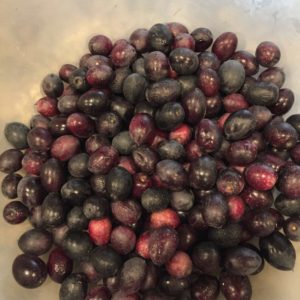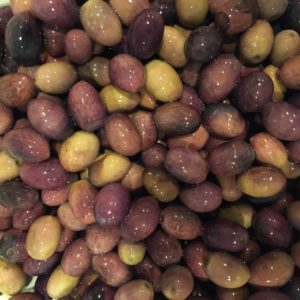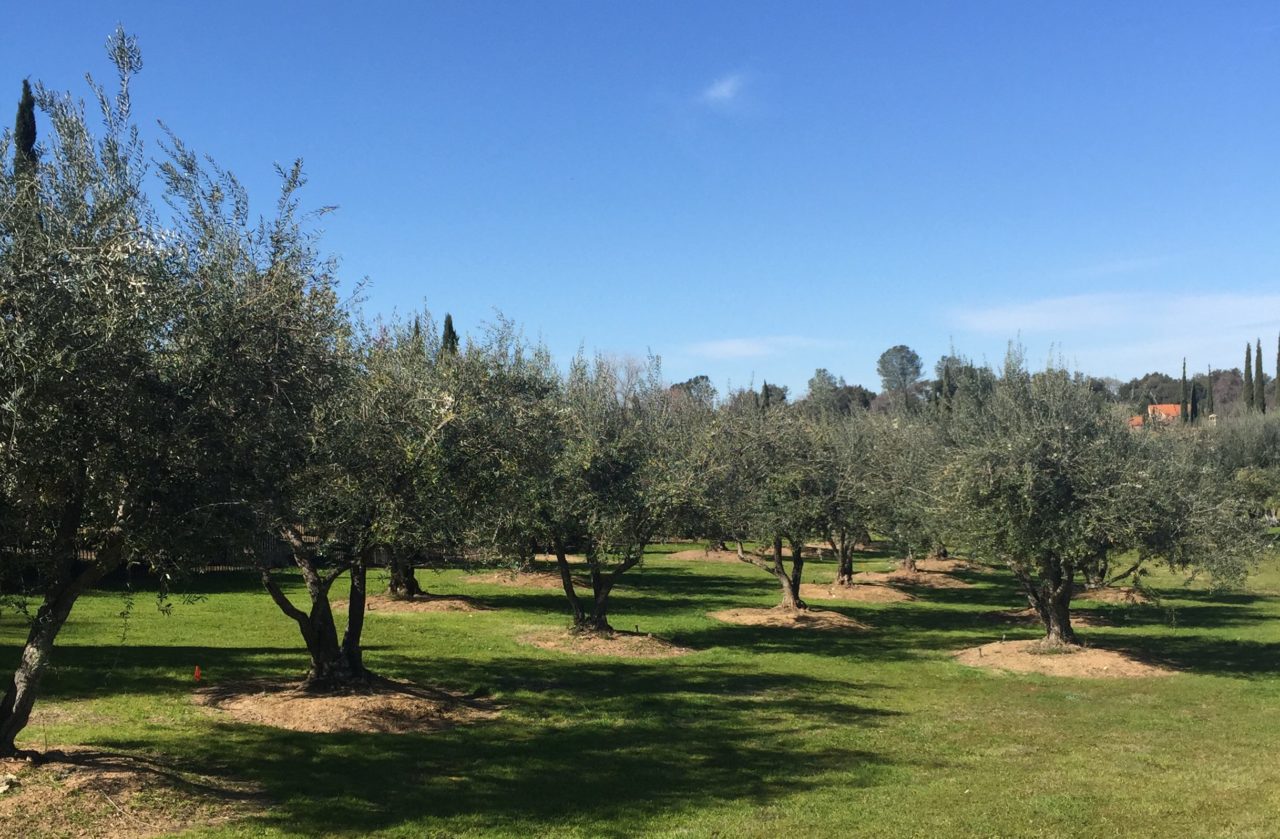Mediterranean olives are the other crop we have here at Clos du Lac. We’ve got several small groves throughout the property and they flourish in the same climate as the vineyards. While we sell our wine grapes to area wineries, our olive crop we keep to ourselves, and generally use it to make olive oil. This year we had a banner crop and harvested 4 tons for olive oil and still had plenty to spare. If we had tried we could have harvested another couple of tons, but we decided we had enough for the season.
Key to the high production were the fruit fly traps that a neighbor found and that a group of volunteers meticulously maintained throughout the season. I’m not going to go into those now, but perhaps I’ll write more on those later.
So what to do with the excess olives? Why brine some of course. I did this a couple of years back and got some rave reviews. Last year I waited too long to harvest and I wasn’t happy with how they turned out. This year I harvested in two small batches. One on New Years Eve and then another batch on January 21st from our small tree in our back yard that produces some smaller fruit.
Image below shows some fresh picked black olives.

When you harvest fresh olives, they are extremely bitter, you need to cure them some how to extract the bitterness.
There are a variety of different ways to do this depending upon the type of olives and personal preference. Many people got the lye curing route, but I just have no desire to work with lye, particularly when it comes to food.
Instead I prefer to use the salt water brining method I found on the UC Davis website. The recipe for Greek-style black olives in brine. It’s fairly simple and just requires patience. It’s the patience part that reminds me of winemaking.
Brining Black Olives
Step 1: Harvest your olives. Make sure to check for blisters that indicate a fruit fly got to it, and discard and blistered or damaged fruit.
Step 2: Rinse the olives and make sure the olives in a given batch are of a similar size.
Step 3: Prepare the initial brine: Medium Brine: 8 ounces (3⁄4 cup) of pickling salt per gallon of cool water. I use Morton’s Kosher salt you can get at WinCo Foods.
Step 4: Pour the Medium Brine over the olives in a container that you can make airtight once you fill it with brine. Getting most if not all of the air out of the container. This really helps to avoid or reduce mildew from growing on the surface of the olives. Store this container in a cool dark place (between 60 – 80 degrees) for 7 days.
Step 5: Change the brine out for a Strong Brine: 1 pound (11⁄2 cups) of salt per gallon of water. Store the olives in a cool dark place.
Repeat step 5 replacing the brine every 2-3 weeks. Do this for at least 2 months, and more likely 3 months depending upon how bitter the olives taste. Rinse and taste an olive or two after 2 months and then each time you change the brine until you decide they are ready.

The image on the right is the same olives after brining. They lose a lot of their color, leached away along with the oleuropein that gives the olives their bitterness.
Olives can be stored in strong brine for up to 1 year.
Step 6: Soak the olives in fresh water overnight before serving or jarring, this helps remove the saltiness. Sometimes I’ll soak them longer if they are particularly salty.
Jarring and serving. I like to soak the olives in fresh olive oil, a slice of citrus (orange or lemon from one of our trees) and fresh rosemary, thyme and other herbs.
A word on mold growth:
If there is air in your containers you can get mold growth on the surface of your olive/brine solution. As long as the mold is only on the surface, you can skim it off and rinse the olives then replace the brine. If the mold is inside or growing from the olive, then discard the olive. I’ve learned to store the olive brine combination in a tupperware type container that i can fill and purge the majority of the air from. This greatly reduces mold growth opportunity, and I’m please to say this past year I avoided it entirely.
Happy brining.

Leave a Reply
You must be logged in to post a comment.